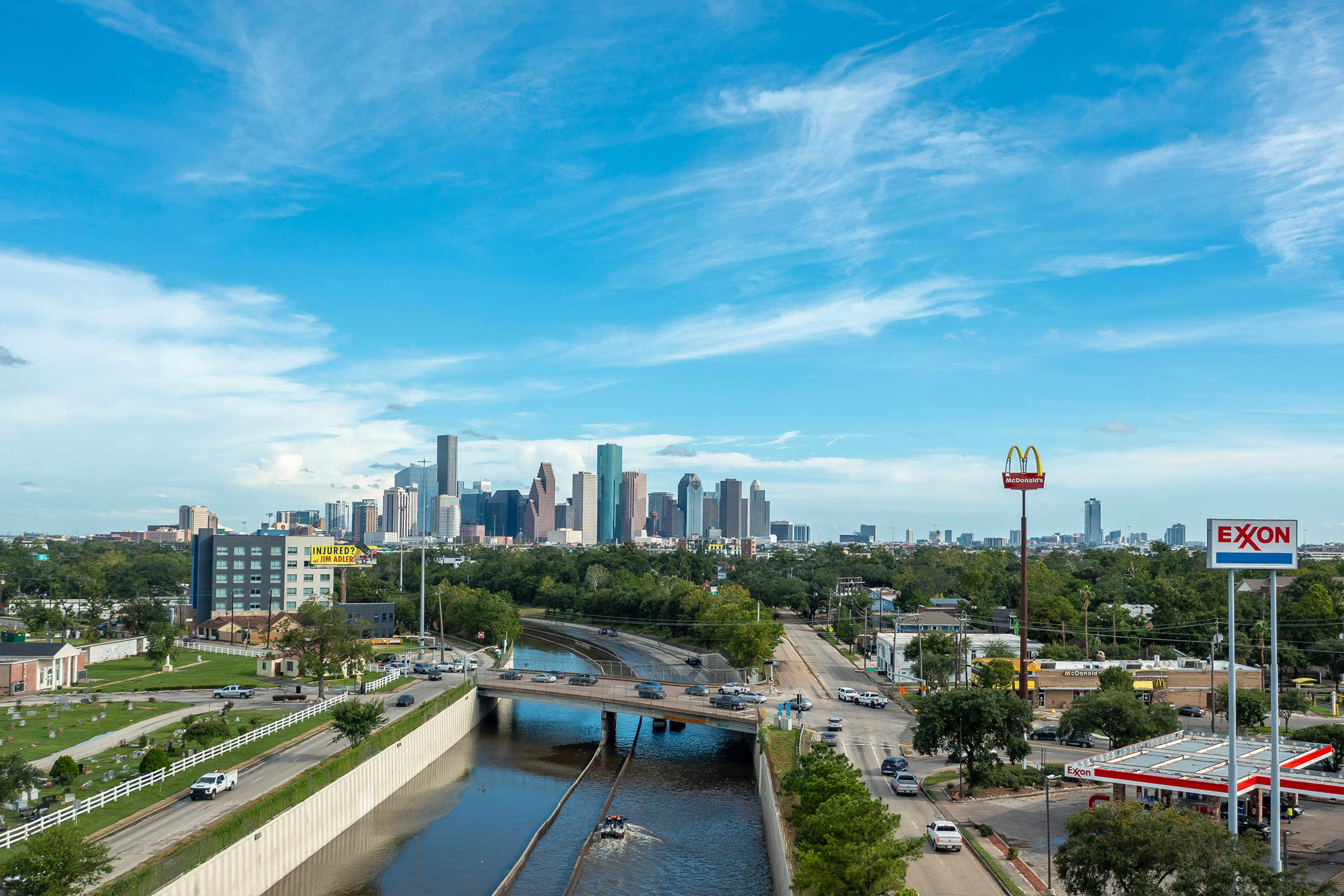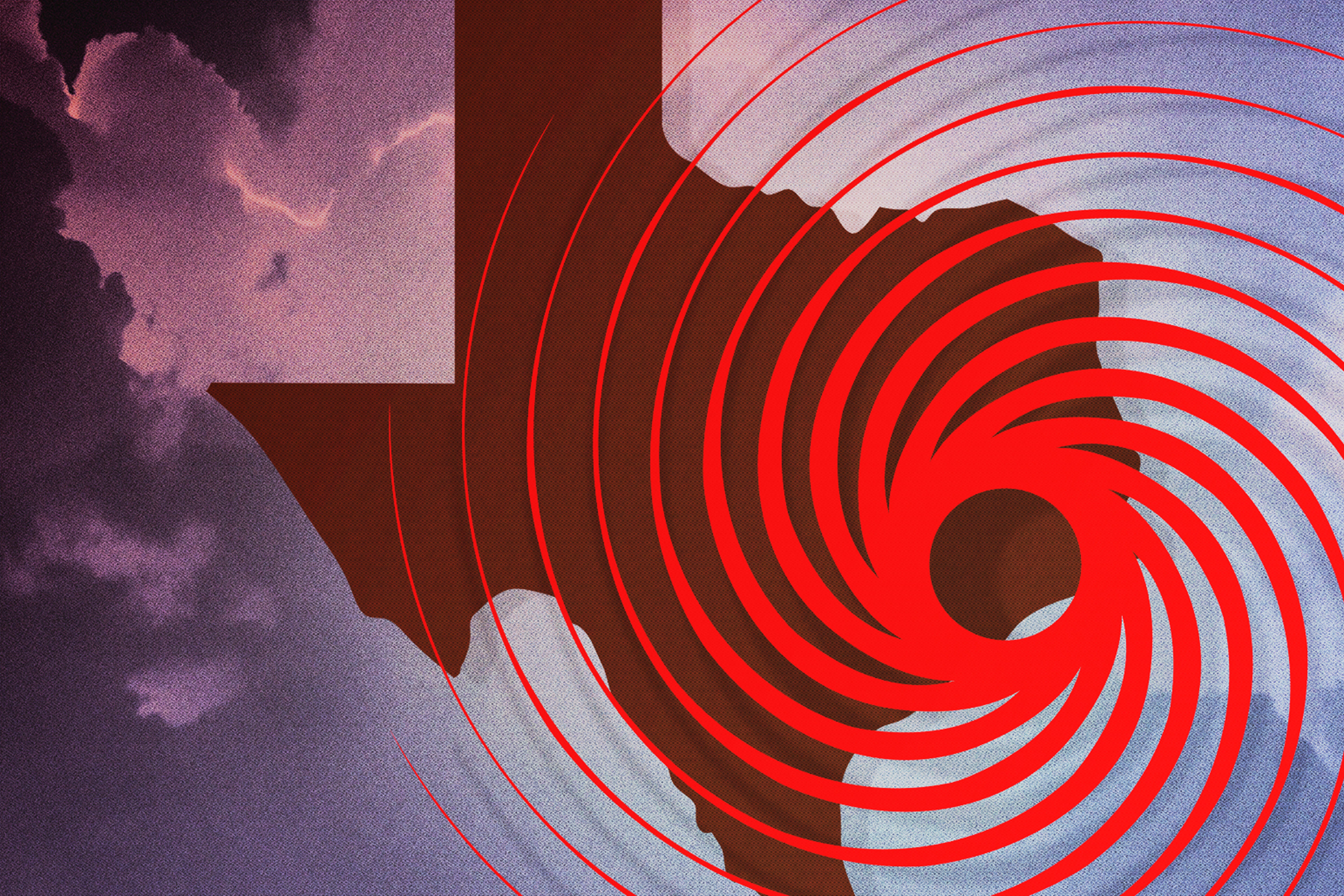How Eric Berger and Matt Lanza Became Houston’s Most Trusted Meteorologists

Image: Michael Starghill
Editor’s note: Eric Berger and Matt Lanza are the recipients of Houstonia’s 2024 Houstonian of the Year award. This is the story of how they became Houston’s most trusted meteorologists. You can read about the four other finalists here.
We’ll be blunt: Houston weather is scary. In 2024 alone, we faced a derecho—a term many of us didn’t even know existed until we were cleaning up the debris from one—and Hurricane Beryl, along with the usual spots of flooding, drought, storms, refinery fires, and unplanned power outages that have come to mark our day-to-day. In a humid subtropical climate characterized by instability and a predilection toward prepper behavior (seriously, leave some TP for the rest of us), Houstonians have one reliable resource when it comes to helping us keep our heads above water—literally.
For the past decade, Space City Weather readers know that when Eric Berger and Matt Lanza say not to panic, there’s no need to fill up the gas tank and lead-foot it over to Austin. The site launched in 2015 with the tagline “Hype-Free” and a goal to keep the greater Houston area updated on weather forecasts without any hyperbole or fearmongering. This ethos has earned them a loyal readership and a reputation as the city’s most trusted meteorologists.
“All of the communication about weather is to go immediately to the reasonable worst-case scenario. If there’s flooding in Houston, the TV stations are going to send their TV trucks to wherever it’s flooding, whereas for the majority of Houston, it’s perfectly fine,” Berger says. “All the incentive was to hype up weather events for clicks, for attention, clout, whatever. We kind of wanted to be an antidote to that.”
And when they do declare a catastrophe, you know it’s real—time to keep a cool head and get ready to either evacuate or stay put with survival supplies on hand.
Berger and Lanza took different paths toward the discipline. Lanza majored in meteorology at Rutgers University before launching his broadcast forecasting career in upstate New York, where he helped start a successful local weather blog. One day, after delivering a grim forecast of a lake-effect snow event on the last shopping weekend before Christmas, the general manager and news director of the station he worked at came up to him.
“[They] were like, ‘Look, are you really sure about this? Because we don’t want to scare away people from patronizing our advertisers,’ and that just kind of struck me as ‘What?’” Lanza says. “Maybe I was young and naive at that point, but it really kind of left a sour taste in my mouth.”
He eventually quit broadcasting and went into forecasting for the energy sector, where he’s been working for about 15 years. It’s what brought him to Houston in the first place.
Berger got his undergraduate degree in astronomy from UT Austin, followed by a master’s degree in journalism from the University of Missouri. He was a science writer for the Houston Chronicle from 1998 to 2015, then moved on to the tech news outlet Ars Technica, where he remains today. He began science blogging in 2005—an eventful time in disasters, to say the least, as both Hurricane Katrina and Hurricane Rita landed that year. After his Ike coverage for the Chronicle garnered a large audience in 2008, Berger decided to step up his game by enrolling in the meteorology certification program at Mississippi State University.
“I had a knack for it, and I kind of liked it. It was funny, because no one at the newspaper wanted to write about weather. It was really considered like the diminutive position,” he says. “I was called ‘Weather Boy,’ somewhat affectionately, but somewhat mockingly.”
Space City Weather provided Berger a chance to continue weather blogging once he left the paper. A fan of Lanza’s work, he thought him an obvious choice to bring on board to the then-nascent site, which expanded to include spinoff blog The Eyewall, dedicated to monitoring weather patterns in the Atlantic tropics, in 2023.
Both Berger and Lanza live in the greater Houston area, which they believe to be an essential aspect of their reporting. They share deeply personal stakes in the local weather, and have themselves experienced serious damages in extreme situations like hurricanes and floods. When they provide forecasts and commentary, it comes from the same concerns as any other Houstonian—they just happen to know more about the science of it all. A wild weather year like 2024 proved to be challenging on multiple levels, leading to permanent changes in how the Space City Weather team approach their reporting.
“I think Eric and I were both a little shaken by the suddenness of the derecho. Those are often difficult things to predict anyway, but when one occurs in your backyard, it stings a bit,” Lanza says. He mentions that there was a threat of severe weather earlier in the week, but it ended up being a dud, only for the day of the derecho to blow in a few surprises.
“As a result of the derecho, we are now implementing more updates during days with any severe weather risk. We need to be updating people when the story changes,” Lanza says. “Even if it was late in the game, it would have been helpful for us to have been more vocal, and not just on social media, when it was apparent that something significant was headed for Houston.”
“Something significant” happens more than a few days per year, Houston being Houston and all. Space City Weather sponsor Reliant provided Berger and Lanza with generators to help them continue to report crucial weather news through natural disasters and infrastructure collapses. Lanza sometimes even evacuates to Dallas or College Station, reducing the risk of disruptions.
When Hurricane Beryl struck in July, it provided them another impetus to rethink their forecasting and communications strategy. Lanza and Berger start their forecasts by checking weather modeling data gleaned from different government organizations and private sector companies from around the world. The pair then search for patterns and check their predictions against the National Weather Service’s meteorologists—as well as other reliable industry peers—for accuracy, adjusting accordingly. As of 2024, they’ve begun looking at additional modeling to help Houstonians know how to react when the unexpected occurs.
“Every storm is an opportunity to learn what worked and what didn’t,” Lanza says. “And I think that [Beryl] was a category one, [so] we sort of underestimated just how impactful that would be, especially since it ended up tracking right over the city.”
During these moments, the meteorologists also pay close mind to their word choices. For example, Lanza points out that discussing “cold fronts”—relatively standard terminology in his field—can sound menacing to Houstonians who remember 2021’s Winter Storm Uri.
“It becomes important for us to make sure that we’re communicating not just the forecast correctly, but in the words that matter. I think other meteorologists are understanding this a little bit more, not just here in Houston,” Lanza says. “As more and more places deal with more extreme weather, they’re getting this idea that there has to be a more empathetic tone.”
They’re also improving their Space City Weather Flood Scale, which they created in 2019 to help Houstonians better understand the severity of localized flooding events. They’re working with University of Houston neuropsychologists to make sure their wording doesn’t accidentally incite panic when those in the path of danger need to keep collected. Part of this is motivated by what Berger refers to as “a pushback against the ‘enshittifcation of the internet,’” offering high-quality resources motivated by a sincere love of the topic rather than maximizing profits.
“This sounds really corny, but it’s actually absolutely true: We just really mostly care about getting the forecast right,” Berger says. “If it’s not going to be a big event, we’ll shout that from the rooftops. And if it is going to be a serious event, then we’ll shout that.”









